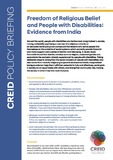| dc.contributor.author | Thompson, Stephen | |
| dc.contributor.author | Rohwerder, Brigitte | |
| dc.contributor.author | Arockiasamy, Clement | |
| dc.coverage.spatial | India | en |
| dc.date.accessioned | 2021-06-22T14:46:03Z | |
| dc.date.available | 2021-06-22T14:46:03Z | |
| dc.date.issued | 2021-06 | |
| dc.identifier.citation | Thompson, S.; Rohwerder, B. and Arockiasamy, C.(2021) Freedom of Religious Belief and People with Disabilities: Evidence from India, Policy Briefing 5, Coalition for Religious Equality and Inclusive Development, Brighton: Institute of Development Studies, DOI: 10.19088/CREID.2021.004 | en |
| dc.identifier.uri | https://opendocs.ids.ac.uk/opendocs/handle/20.500.12413/16708 | |
| dc.description.abstract | Around the world, people with disabilities can be the most marginalised in society. Having a disability and being a member of a religious minority or an excluded social group can compound the reasons why some people find themselves on the outskirts of social systems which normally provide financial and moral support and a sense of identity and belonging. A recent study from India found that identity markers such as religion, caste and gender can exacerbate the exclusion already experienced by people with disabilities. Taking deliberate steps to strengthen the social inclusion of people with disabilities who also come from minority religious groups and socioeconomically marginalised backgrounds can help them fulfil their potential to fully and effectively participle in society on an equal basis with others, and strengthen community ties, making the society in which they live more inclusive. | en |
| dc.description.sponsorship | Foreign Commonwealth and Development Office (FCDO) | en |
| dc.language.iso | en | en |
| dc.publisher | Institute of Development Studies | en |
| dc.relation.ispartofseries | CREID Policy Briefing;5 | |
| dc.rights | Attribution-NonCommercial-NoDerivs 2.0 UK: England & Wales | en |
| dc.rights.uri | http://creativecommons.org/licenses/by/4.0/ | en |
| dc.subject | Politics and Power | en |
| dc.subject | Poverty | en |
| dc.subject | Rights | en |
| dc.title | Freedom of Religious Belief and People with Disabilities: Evidence from India | en |
| dc.type | Series paper (IDS) | en |
| dc.rights.holder | © Institute of Development Studies | en |
| dc.identifier.team | Power and Popular Politics | en |
| dc.identifier.doi | 10.19088/CREID.2021.004 | |
| rioxxterms.funder | Department for International Development, UK Government | en |
| rioxxterms.identifier.project | Coalition for Religious Equality and Inclusive Development (CREID) | en |
| rioxxterms.version | VoR | en |
| rioxxterms.versionofrecord | 10.19088/CREID.2021.004 | en |
| rioxxterms.funder.project | 7a473ec6-92f8-49ff-98df-9ec27d8d5fe6 | en |


